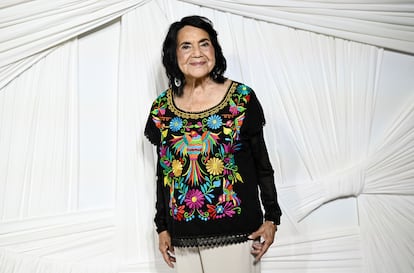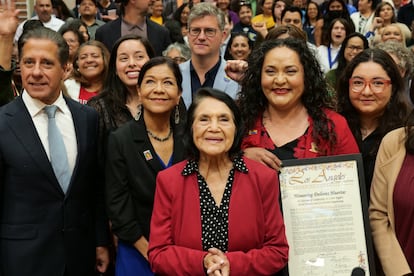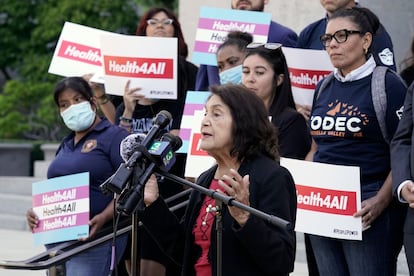Dolores Huerta: ‘Trump is a fascist and his goal is to hurt and destroy’
The tireless advocate for labor and immigrant rights turns 95 at a crucial moment for social awareness in the United States. In an interview with EL PAÍS, she reflects on Trump, deportations, visa revocations, and the end of parole

At 95 years old, Dolores Huerta continues to walk firmly along the same path she began in the 1960s, when she raised her voice alongside César Chávez to demand fair wages, decent conditions, and respect for farmworkers in California, Arizona, and New Mexico, where she was born. Her slogan, “Sí, se puede” (Yes, we can) — born as a defiant response to the skepticism of those in power and embraced as a rallying cry by generations who still believe in the possibility of change — continues to follow her wherever she goes.
Today, the struggle of Dolores Huerta — and of all those she has inspired — has evolved. The democracy that for decades was held up as a model of institutional stability and civic progress now seems to be faltering under the weight of rhetoric that casts migrants as enemies, of a president who deports people indiscriminately and without due process to a maximum-security prison in El Salvador, and of a narrative that rewrites the history of exclusion as if it were a badge of national pride. In this climate, Huerta’s voice stands as both memory and resistance.
She believes — and repeats — that grassroots organizing remains the most powerful tool available to communities, and that a united voice can shift the foundations of power. Three months into Donald Trump’s second term, as attacks on Latino communities intensify once again, the union leader remains vigilant. History has vindicated her, but it hasn’t granted her rest. Speaking with steady conviction during a video call with EL PAÍS, en route to the Immigrant Day of Action 2025 conference in Sacramento, California, she reflects on seven decades of activism, the enduring impact of the foundation that bears her name, and a legacy she refuses to allow to be silenced. Because, as she says, “sometimes you have to get kicked in the butt to wake up.”
Question. You have fought against racism and police brutality, issues that seem more urgent than ever today. How does it feel to see undocumented immigrants deported to El Salvador without due process, or sent to Guantánamo?
Answer. What’s happening is horrific. President Trump wants to scare migrants so they’ll leave the country out of fear. It’s a very sad tragedy we’re experiencing in the United States.
Q. In your words, how do you define Trump?
A. He’s a person who doesn’t have much intelligence. He’s someone filled with resentment and hatred toward people of color, and he maintains that hatred, especially toward Mexicans. Trump is a fascist, and his goal is to hurt and destroy as many people as he can.
Q. What do you think is the key to resistance and defending what has been so hard won?
A. The key is to continue organizing. Now is our chance to prepare for the 2026 [midterm] elections. If we start organizing now, we’ll be ready and able to elect more Democratic members of Congress. Currently, their majority is very small and fragile, but we can increase it and push back against these policies.

Q. You were the person who coined the slogan “Sí, se puede.” What does that phrase mean in today’s context?
A. This phrase is not just an affirmation that “we can,” but that every person, every individual, has the power to do something. Today, more than ever, we know that if we organize, if we unite, if we take direct action, we can counter everything Trump is doing. And most importantly, we must organize to register people and motivate them to vote in the upcoming elections. We have to push them, convince them that their vote is key, essential to protecting our democracy.
Q. Do you still believe in boycotts as a political tool, especially against companies that support Trump?
A. Of course. There are corporations like Target, Walmart, Starbucks, McDonald’s, and many others that seem afraid of Trump. They’re eliminating their diversity, inclusion, and equity policies. So, we must make it clear to them that if they don’t respect us, if they don’t implement policies that create opportunities for people of color, women, and the LGBTQ+ community, then we will be the ones who won’t give them our money.
Q. You’ve said before that people “sometimes need a kick to wake up.” Is this one of those moments?
A. Yes, because when we see these horrific deportations, when we see them taking away visas from students, or from people from Cuba, Haiti, Nicaragua, and Venezuela, it makes you realize how serious all of this is. They’re also taking away visas from many people who were already in the process of obtaining legal residency. It’s very sad, very painful, and it’s definitely a moment that should wake us up.
Q. During the pandemic, in a video call with the children of Dolores Huerta Elementary School in San Francisco — many of them children of migrant families — you told them: “When they tell us that we must return from where we came from, I respond: ‘We are here, where we came from.’”
A. What I wanted to tell them is that many migrants who come to the United States do so because they are escaping very difficult situations: political persecution, hunger, or even the consequences of climate change. In some places, they can no longer plant crops, they can no longer harvest, and people simply have nothing to eat. But we must remember that this land was Mexico before it became the United States. Therefore, we must be a country with open arms, that welcomes with dignity those forced to leave their homes, as it did in the past with those who emigrated from Europe.
Q. Your legacy lives on not only in the streets and in history books, but also in the work of the Dolores Huerta Foundation.
A. We’ve worked hard in education. A very clear example took place in Bakersfield, in Kern County, California. In 2014, we filed a lawsuit against the school district for expelling more than 2,000 high school students (mostly Latino) in a single year. We won that case, and thanks to that effort, today the number of expulsions has dropped to fewer than 21 per year. This demonstrates the impact that community organizing can have. We work from the grassroots, training local leaders in each community. We teach them that they have the power to solve their own problems, without having to wait for someone from outside to tell them what to do.

Q. Are you still offering workshops on what to do if you are detained by ICE or the police?
A. Yes, they are very important. At the Dolores Huerta Foundation, in coordination with other groups, we have distributed thousands and thousands of “Know Your Rights” cards. These cards are a key tool for people to protect themselves. We know they have been helpful for many people, especially when they are detained by ICE or the police, as they let them know exactly what rights they have at that moment.
Q. If you could say one thing to the entire country right now, what would it be?
A. The United States has benefitted from all migrants. We know that millions have contributed to Social Security — money they will never be able to claim — and that contribution must be acknowledged. It’s essential to value the work and the sacrifices migrants have made for this country. They should not be treated as criminals. Even though that’s the narrative Trump has used, it’s one that must be challenged.
Q. How would you like to be remembered when you are gone?
A. As someone who has had a lot of faith in people, who believes in their ability to organize, I think it’s important to give people the tools they need to do that. Once they understand they have the power to organize, they can accomplish many things on their own.
Q. Do you feel like you have something left to do in life?
A. Yes, because we know there are still many homeless people, many who haven’t been able to obtain citizenship, many who haven’t registered to vote, and many who don’t understand the importance of participating in the electoral life of the United States. If we can convince them, we can change everything. In our own community, there are also people who still haven’t learned the basics. They don’t respect women who make decisions about their own bodies, non-binary people, and all those who choose to love someone of the same sex. We must understand that, as Benito Juárez said, “respect for the rights of others is peace.”
Sign up for our weekly newsletter to get more English-language news coverage from EL PAÍS USA Edition
Tu suscripción se está usando en otro dispositivo
¿Quieres añadir otro usuario a tu suscripción?
Si continúas leyendo en este dispositivo, no se podrá leer en el otro.
FlechaTu suscripción se está usando en otro dispositivo y solo puedes acceder a EL PAÍS desde un dispositivo a la vez.
Si quieres compartir tu cuenta, cambia tu suscripción a la modalidad Premium, así podrás añadir otro usuario. Cada uno accederá con su propia cuenta de email, lo que os permitirá personalizar vuestra experiencia en EL PAÍS.
¿Tienes una suscripción de empresa? Accede aquí para contratar más cuentas.
En el caso de no saber quién está usando tu cuenta, te recomendamos cambiar tu contraseña aquí.
Si decides continuar compartiendo tu cuenta, este mensaje se mostrará en tu dispositivo y en el de la otra persona que está usando tu cuenta de forma indefinida, afectando a tu experiencia de lectura. Puedes consultar aquí los términos y condiciones de la suscripción digital.









































